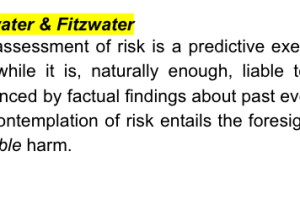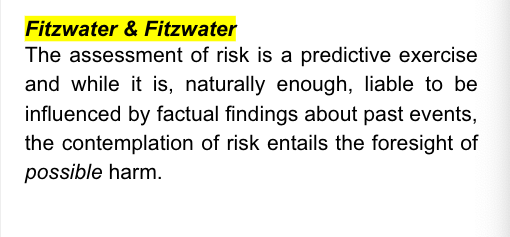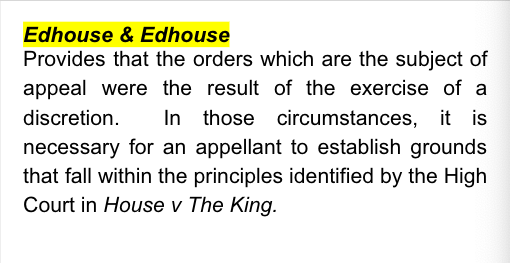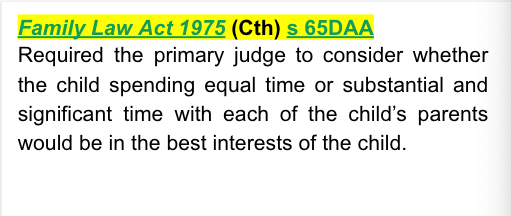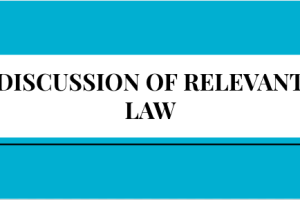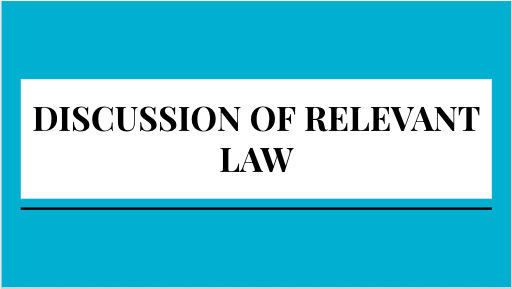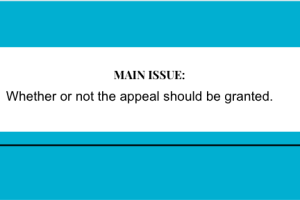- · 4717 friends
Mother Appeals from Parenting Orders

Hickson & Matthew [2022] FedCFamC1A 161 (11 October 2022)

The mother filed an appeal from orders changing the child’s residence from living with the mother to the father. The primary judge ordered unsupervised time with the mother despite finding of unacceptable risk for the child in the mother’s care. The Court, in determining whether to grant the appeal, assessed the adequacy of reasons.

Facts
The parties commenced cohabitation in August 2017 and lived together until August 2018. The child was born in 2018 but, as a result of complications associated with her birth, the child and the mother remained in the hospital until August 2018. The parties separated approximately three weeks after the child’s birth in circumstances where the mother alleges that the father had engaged in an act of family violence resulting in the child being struck on the side of the head with a mobile phone. On 22 November 2018 on a “without admissions” basis, the father consented to the making of a Protection Order naming the mother as the aggrieved and the child as a protected person.
Despite the existence of the protection order, the mother facilitated the child having contact with the father for six visits during the period from November 2018 to 8 January 2019. On 8 January 2019, the mother ceased time between the father and the child. On 11 February 2019, the father filed an Initiating Application in the Federal Circuit Court of Australia (as it was then known) seeking orders inter alia for the child to live with him and spend time with the mother.
On 1 July 2019, consent orders were made which provided for the parents to have equal shared parental responsibility, for the child to live with the mother and spend time with the father on a graduated basis, commencing at four hours every Saturday for a month, supervised by the mother and then for a period of a month with the mother supervising only the first hour of time that the child spent with the father.
The orders provided for time to progress after that period such that the father spend four hours of unsupervised time with the child each Saturday until the child reached 18 months of age. On 26 September 2019, those orders were varied by a registrar of the Court to provide for the child to spend fortnightly, as opposed to weekly, time with the father.
The parties were also directed to enrol in a Triple P Parenting Program and Managing Emotions Program. On 18 February 2020, orders were made for the child to spend time with the father from 8.00 am to 4.00 pm each alternative Saturday on an unsupervised basis, commencing on 29 February 2020. Orders were further made directing the parties to attend a Parenting Orders Program.
On 18 May 2020, a judge of the Court ordered the father to spend weekly time with the child for four consecutive weeks between 8.00 am and 4.00 pm. Thereafter, commencing on 11 July 2020, the child was to spend time with the father for two weekends out of three on Saturday from 8.00 am to 4.00 pm and then on Sunday from 9.00 am to 3.00 pm, with changeovers to occur on the front porch of the mother’s home. On 17 February 2021, consent orders were entered which provided for interim parenting arrangements such that the child lives with the mother and spend time and communicates with the father each alternative weekend from 8.00 am Saturday to 4.00 pm Sunday, with changeover to occur on the front porch of the mother’s residence.
It was not disputed that the mother had been the victim of physical abuse at the hands of her father when she was a child and had been sexually abused by a boarder who resided at the then family home. The mother engaged in substance abuse and committed acts of violence, most relevantly against her father who had abused her as a child. The primary judge also noted a history of the mother suffering episodes of mental illness which she found had not been fully disclosed by the mother to the Court, the family consultant or the single expert psychiatrist. This lack of disclosure, the primary judge noted, was a cause for concern.
By Notice of Appeal filed on 3 June 2022, the appellant mother asserted that the Honourable Judge erred at law in making a finding the Mother was an unacceptable risk of harm and then Ordering regular unsupervised time without pre-conditions.

Issue
Whether or not the appeal should be granted.

Applicable law



Analysis
The reasons clearly state that the primary judge ordered there be a change of residence as a result of her Honour’s finding that the child faced an unacceptable risk of harm in the mother’s care. The potential harms to which the child would be exposed in the mother’s care were referred to in [79] of the reasons.
The primary judge indicated that she would not have arrived at the conclusion that the child faced an unacceptable risk of harm in the mother’s care “were it not for the serious incident of domestic violence in March of 2021”. The primary judge described what occurred on that day by adopting the account made by a police officer consequent upon the mother attending the City B police station on 8 March 2021 to report the incident.
That account refers to the mother as being the “aggrieved” and the perpetrator of violence against the mother being identified as the “respondent”, who is a male person known by the name of Mr. E with whom the mother was in a relationship at the time of the incident and who is not a party to the appeal. It was not suggested that the self-admission of substance use was in relation to the mother.
It appears to be that of the woman who was in the presence of Mr. E. In assessing the adequacy of reasons provided by the primary judge for the orders which she made in these proceedings and, in particular, the order for there to be a change in the child’s residence, it is to be noted that the primary judge, clearly set out the nature of the harm that might befall the child if she were to be exposed to family violence and dysregulated conduct associated with a parent’s mental health issues.
The reasons do not reveal, however, whether the primary judge considered and regarded as relevant to the assessment of potential conduct that would cause harm to the child, several significant aspects of the evidence presented in the proceedings. The primary judge did not refer to the unchallenged evidence of the appellant that Mr. E, who was the perpetrator of the violence that had occurred in March 2021, was in prison as a result of his conduct and that the mother had not had any contact or relationship with him “since the day he bashed [her]”.
In finding a risk because an “unknown” existed that the mother may have “serious cognitive difficulties”, the primary judge failed to refer to the oral evidence of Dr. D that: "...despite the relationship difficulties that I’m aware of, that sort of behaviour has not been ongoing." In finding the potential for the mother to return to a pattern of alcohol and substance abuse if she became stressed, the primary judge did not refer to the evidence of Dr. D where he stated: "I’m amazed and have to note that it would appear that the issues that I mentioned on page 11 of my report about increased risk for a capacity for violence, emotional and psychological dysfunction, memory dysfunction, credibility issues, the potential for recurrent alcohol abuse, substance use that was denied, it appears that the mother has been doing fairly well despite my increased risk concerns about these issues."
Conclusion
The appeal is allowed. Orders 26, 27, 28, and 29 made on 25 February 2022 are set aside. The proceedings are remitted for re-hearing by a judge of the Federal Circuit and Family Court of Australia (Division 2) other than the primary judge.


